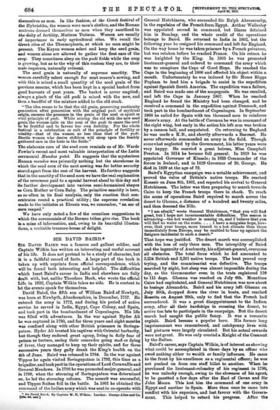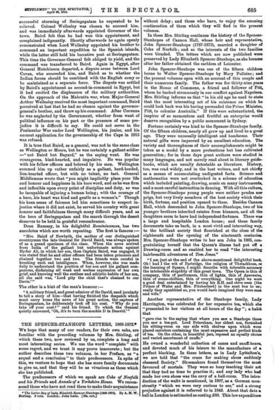SIR DAVID BAIRD.* SIR DAVID BARD was a famous and
gallant soldier, and Captain Wilkin has written an interesting and useful account of his life. It does not pretend to be a study of character, but it is a faithful record of facts. A large part of the book is taken up with reprints from official correspondence, which will be found both interesting and helpful. The difficulties which beset Baird's career in India and elsewhere are fully dealt with, but, unlike Theodore Hook, who wrote the official Life in 1832, Captain Wilkin takes no side. He is content to let the events speak for themselves.
David Baird, the fifth son of William Baird of Newbyth, was born at Newbyth, Aberdeenshire, in December, 1757. He entered the army in 1772, and during his period of active service he served in India, Egypt, Cape Colony, and Spain, and took part in the bombardment of Copenhagen. His life was filled with adventures. In the war against Hyder Ali he was captured in 1780, and for three years and eight months was confined along with other British prisoners in Seringa- patam. Ryder .Ali treated his captives with Oriental barbarity, but though they endured great agony, living in daily fear of poison or torture, seeing their comrades going mad or dying of fever, they managed to keep up their spirits, and for three successive years they gaily drank the King's health on the 4th of June. Baird was released in 1784. In the war against Tippoo he again visited Seringapatam in 1792, this time as a brigadier, and took part in the operations of Lord Cornwallis and General Meadows. In 1798 he was promoted major-general, and in 1799, when the storming of Seringapatam was determined on, he led the storming column. The assault was successfnl, and Tippoo Sultan fell in the battle. In 1801 be obtained the command of the Indian army which was sent to co-operate with • Sir Darid Baird, By Captain V. H. Wilkin. London : George Allen and Co. (12a. 6c1. net.]
General Hutchinson, who succeeded Sir Ralph Abercrornby, in the expulsion of the French from Egypt. Arthur Wellesley was appointed second in command, but illness detained him in Bombay, and the whole credit of the operations belongs to Baird. He returned to India in 1802, but the following year he resigned his command and left for England.
On the way home he was taken prisoner by a French privateer, but was retaken before lie reached France. On his return he was knighted by the King. In 1805 he was promoted lieutenant-general and ordered to command the army which was to recapture the Cape of Good Hope. He reached the Cape in the beginning of 1806 and effected his object within a month. Unfortunately he was induced by Sir Home Riggs Popham to lend him a brigade to assist in the expedition against Spanish South America. The expedition was a failure, and Baird was made one of the scapegoats. He was recalled, and left the Cape in January 1807. When be reached England he found the Ministry had been changed, and be received a command in the expedition against Denmark, and took part in the bombardment of Copenhagen. In September 1808 he sailed for Spain with ten thousand men to reinforce lioore's army. At the battle of Corunna he was in command of the right wing, but early in the action his left arm was broken by a cannon ball, and amputated. On returning to England he was made a KB., and shortly afterwards a Baronet. He never afterwards commanded an army in the field. Though somewhat neglected by the Government, his latter years were very happy. He married a great heiress, Miss Campbell Preston. In 1814 he became full general. In 1819 he was appointed Governor of Kinsale; in 1820 Commander of the forces in Ireland; and in 1829 Governor of St. George. He died in 1829 at the age of 72.
Baird's Egyptian campaign was a notable achievement, and proved the value of Britain's native troops. He reached Kosseir on June 8th, 1801, and reported his arrival to General Hutchinson. The latter was then preparing to march towards Cairo to keep the French troops there in check. To reach the scene of operations Baird required to march across the desert to Ghenna, a distance of a hundred and twenty miles, and then descend the Nile.
"I am afraid," wrote General Hutchinson, "that you will find great, but I hope not insurmountable difficulties. The season is advancing—the hot weather is coming on, and I believe that you will find no water on the route. . . . I have a sanguine hope, how- ever, that your troops, more inured to a hot climate than those immediately from Europe, may be enabled to bear up against the fatigues incidentRl to such a march."
That hope was justified. The desert march was accomplished with the loss of only three men. The intrepidity of Baird and the ingenuity of Auchnanty, his adjutant-general, overcame all obstacles. The total force which he led amounted to 3,234 British and 3,201 native troops. The heat proved very trying, and the commissariat was defective. The troops marched by night, but sleep was almost impossible during the day, as the thermometer even in the tents registered 110 to 115 degs. Ghenna was reached on July 6th. Meantime Cairo had capitulated, and General Hutchinson was now about to besiege Alexandria. Baird and his army left Ghenna on July 30th, dropped down the river in boats, and reached Rosetta on August 20th, only to find that the French had surrendered. It was a great disappointment to the Indian
army, after all their hardships in crossing the desert, to arrive too late to participate in the campaign. But the desert march had caught the public fancy. It was a romantic
exploit. Baird became a popular hero. His former long imprisonment was remembered, and catchpenny lives with bad pictures were largely circulated. But his actual rewards were not great. He was only created a Knight of the Crescent by the Sultan.
Baird's career, says Captain Wilkin, is of interest as showing what could be accomplished in those days by an officer who owed nothing either to wealth or family influence. He came to the front by his excellence as a regimental officer; he was not pushed on from one staff billet to another. When he purchased the lieutenant-colonelcy of his regiment in 1790, he was unlucky enough, owing to the slowness of his agent, to be gazetted a few days after the Earl of Cavan and Sir John Moore. This lost him the command of one army in Egypt and another in Spain. More than once he came into conflict with his superiors, and lost favour with the Govern- ment. This helped to retard his progress. After the successful storming of Seringapatam be requested to be relieved. Colonel Wellesley was chosen to succeed him, and was immediately afterwards appointed Governor of the town. Baird felt that he had won this appointment, and complained indignantly. Shortly afterwards he again openly remonstrated when Lord Wellesley appointed his brother to command an important expedition to the Spanish islands, while the latter still held his lucrative post at Seringapatam.
This time the Governor-General felt obliged to yield, and the command was transferred to Baird. Again in Egypt, after General Hutchinson departed, a dispute arose between Lord Cavan, who succeeded him, and Baird as to whether the Indian forces should be combined with the English army or be maintained as a separate force. The dispute was settled by Baird's appointment as second-in-command in Egypt, but it had excited the displeasure of the military authorities. On the approach of the Mahratta war, when Major-General Arthur Wellesley received the most important command, Baird perceived at last that be had no chance against the governor- general's brother, and threw up his command. After Corunna he was neglected by the Government, whether from want of political influence on his part or the presence of some pre- judice it is difficult to say. He could not serve in the Peninsular War under Lord Wellington, his junior, and his earnest application for the governorship of the Cape in 1813 was refused.
It is true that Baird, as a general, was not in the same class as Wellington or Moore, but he was certainly a gallant soldier —" not Baird but Bayard," as the saying went. He was courageous, kind-hearted, and impulsive. He was popular with his fellow officers and beloved by his men. Wellington summed him up rather unfairly as a gallant, hard-beaded, lion-hearted officer, but with no talent, no tact. General Middlemass wrote that "you might implicitly place your life and honour and happiness in his bare word, and as he was firm and inflexible upon every point of discipline and duty, so was he incapable of injuring a human being ; with the courage of a hero, his heart was kind and gentle as a woman's." Though his keen sense of fairness led him sometimes to suspect in- justice where it did not exist, he served his country with great honour and faithfulness through many difficult years, and as the hero of Seringapatam and the march through the desert deserves to be held in grateful remembrance.
Dean Ramsay, in his delightful Reminiscences, has two anecdotes which are worth repeating. The first is famous :—
"Mrs. Baird of Newbyth, the mother of .our distinguished countryman the late General Sir David Baird, was always spoken of as a grand specimen of the class. When the news arrived from India of the gallant but unfortunate action against Hyder All, in which her son, then Captain Baird, was engaged, it was stated that he and other officers had been taken prisoners and chained together two and two. The friends were careful in breaking such sad intelligence. When, however, she was made fully to understand the position of her son and his gallant com- panions, disdaining all weak and useless expression of her own grief, and knowing well the restless and athletic habits of her son, all she said was, 'Lord pity the chiel that's chained to our Davie.'"
The other is a hint of the man's humour :—
" A military friend, and great admirer of Sir David, used jocularly to tell a story of him—that having finished the despatch which must carry home the news of his great action, the capture of Seringapatam, he deliberately took off his coat. "Why do you take off your coat ? " said his friend. To which the General quietly answered, 'Oh, it's to turn the muckle D in Dauvid."



























































 Previous page
Previous page